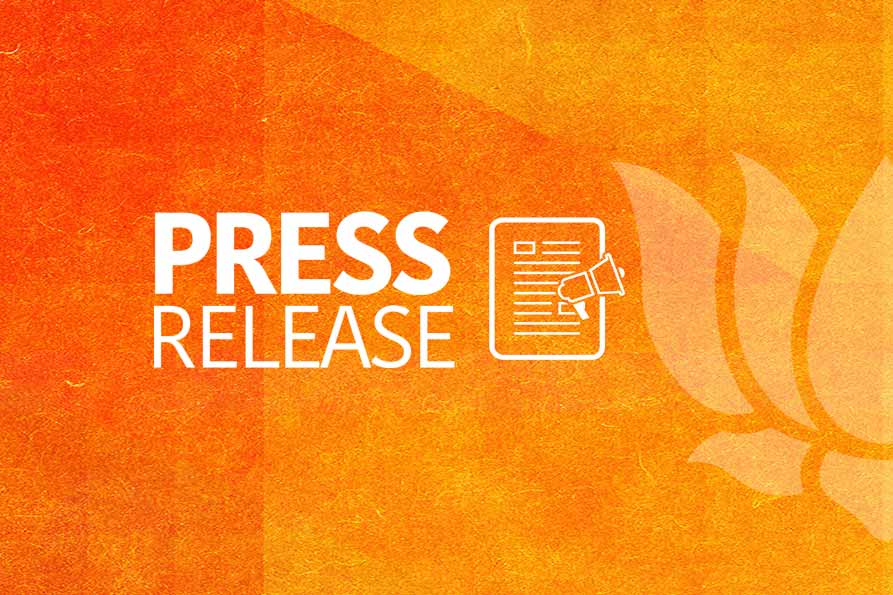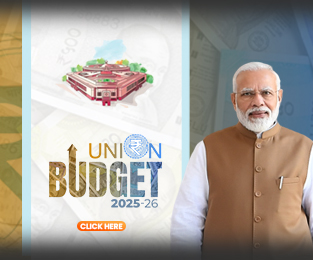
Last Sunday, March 31, 2013 was Easter Sunday, a very important Christian Festival. While all other Christian festivals, according to the Gregorian calendar, fall on a fixed day every year, Easter is a festival that takes place on different dates each year.
Next year for instance, Easter is to be celebrated on April 20, 2014.
 For us in the B.J.P. a party launched in 1980, Easter Sunday has a very special significance. In 1980, Easter Sunday fell on April 6th, the day on which the BJP was launched in New Delhi by Shri Atal Bihari Vajpayee.
For us in the B.J.P. a party launched in 1980, Easter Sunday has a very special significance. In 1980, Easter Sunday fell on April 6th, the day on which the BJP was launched in New Delhi by Shri Atal Bihari Vajpayee.
In June, 1975, the Allahabad High Court pronouncing verdict in an election petition filed by Socialist Party leader Shri Raj Narain struck down Smt. Gandhi’s election to the Lok Sabha. Prime Minister Smt. Gandhi was found guilty of electoral corruption, and barred from contesting any election for a period of six years.
 Following this grave development, the Congress Government imposed an Emergency in the country on the plea of internal disturbances. All fundamental rights under the Constitution were suspended, more than one lakh political activists of opposition parties were put behind bars and the media suppressed in a manner never done even under British Rule. The Emergency lasted for nearly 20 months.
Following this grave development, the Congress Government imposed an Emergency in the country on the plea of internal disturbances. All fundamental rights under the Constitution were suspended, more than one lakh political activists of opposition parties were put behind bars and the media suppressed in a manner never done even under British Rule. The Emergency lasted for nearly 20 months.
In March 1977, when the next Lok Sabha elections were held the Indian electorate for the first time since independence threw out the Congress Party from power in New Delhi. Shri Morarji Bhai Desai, the President of the Congress (O) at that point of time became the Prime Minister, leading a Janata Party Government.
Although I have participated in every Parliamentary election held since 1952 either as a campaigner, or as a candidate, I can unhesitatingly affirm that the 1977 elections have been the most crucial in the political history of the country. On no other occasion did the survival of Indian democracy depend so critically on the outcome of an election. If the Congress Party had won this election, the Emergency, which was a sinister bid to put an end to multi-party democracy in India would have earned popular legitimacy! Similarly, no other election has been a greater testimony to the innate democratic wisdom of the Indian electorate than this one. The electorate punished the Congress Party very severely. In several states like Punjab, Haryana, Himachal, Delhi, UP, and Bihar, the Party could not get a single Lok Sabha seat!
 The Morarji Bhai Government did not last long. Internal factional squabbles brought it to an end in 1979. The Lok Sabha elections were next held in 1980. It was clear to most of us in the Janata Party that we would lose badly. But the drubbing given to the Janata Party was really bad. From its strength of 298 in 1977, the Janata Party slumped to just 31 seats in 1980! In these 31 members, Jana Sangh’s own tally was a mere 16, compared to 93 in 1977.
The Morarji Bhai Government did not last long. Internal factional squabbles brought it to an end in 1979. The Lok Sabha elections were next held in 1980. It was clear to most of us in the Janata Party that we would lose badly. But the drubbing given to the Janata Party was really bad. From its strength of 298 in 1977, the Janata Party slumped to just 31 seats in 1980! In these 31 members, Jana Sangh’s own tally was a mere 16, compared to 93 in 1977.
Shortly after the 1980 elections, a meeting of the Janata Party Executive was convened where it was decided that more attention be paid to the organizational growth of the party. The executive also decided to launch a membership campaign of the Janata Party so that on the basis of a scheduled timetable party elections can be completed.
I believe that it is this decision that made some sections of the party initiate what later came to be known as the anti dual-membership campaign. The campaign was directed against former members of the Jana Sangh who it was alleged were members not only of the Janata Party but also of the RSS. It was known to every-one that RSS was not a political party. This was like accusing a Congressman who was also an Arya Samaji of being guilty of dual membership! Soon a whispering campaign began that if former Jana Sanghis were allowed to keep their association with the RSS the party would alienate Muslim voters.
 During the heated debate on the dual membership issue extremely sage counsel came from Achyut Patwardhan, a renowned Gandhian and freedom fighter. In an article titled ‘Janata, RSS and Nation’ published by the Indian Express. Patwardhan wrote:
During the heated debate on the dual membership issue extremely sage counsel came from Achyut Patwardhan, a renowned Gandhian and freedom fighter. In an article titled ‘Janata, RSS and Nation’ published by the Indian Express. Patwardhan wrote:
“It is on the strength and the contribution to the mass struggle against the emergency that the Bharatiya Jana Sangh was inducted into the Janata Party as its major constituent. What has the Jana Sangh and/or the RSS said or done from the time the emergency was lifted to date which has provoked Mr. Madhu Limaye, Raj Narain and their supporters to launch a rabid campaign of denigration”
Shri Vajpayee, Shri Nanaji Deshmukh and I took strong exception to this dual membership move. In the party meetings, I said that we were being shunned within the party as if we were untouchables. I added:
“The Janata Party had 5 constituents, the Congress (O), Lok Dal, Socialist Party, CFD of Babu Jagjiwan Ram, and the Jana Sangh. Of these, politically speaking, the first four were dvijas, the twice born, whereas Jana Sangh was kind of a harijan adopted into the family.
“On the occasion of the adoption in 1977, there was lot of rejoicing but as time passed, the presence of a Harijan in the family began to pose problems for all. I was not alone in my thinking. My observations echoed the feelings of lakhs of activists and supporters of the erstwhile Jana Sangh across the country. In February-March 1980, Shri Sunder Singh Bhandari and I traveled throughout the country to gauge the opinion at the grass root level of the party. Everywhere that we went we discovered deep resentment amongst former Jana Sangh activists that they were receiving treatment as second class members of the party.”
Janata Party leadership decided to convene a meeting of the party’s national executive on April 4 to clinch this issue of dual membership. Anticipating what would be the outcome of this meeting, along with Shri Vajpayee and Nanaji we all decided to convene a conference of former Jana Sangh members on April 5th and 6th, 1980.
As expected, on April 4th the Janata Party executive decided to expel all former Jana Sangh members from the party. In my autobiography I have recorded :
“Expulsion from the Janata Party came as a big relief to all of us in the Jana Sangh. The two day national convention on 5th, 6th April, 1980 added another invigorating emotion, that of determination”.
Over 3500 delegates assembled at Delhi Ferozeshah Kotla Ground and resolved on 6th April to form a new political organization called the Bharatiya Janata Party. Shri A.B. Vajpayee was elected its first President and Shri Sikander Bakht, Shri Suraj Bhan and I were entrusted the responsibility of General Secretaries.
I have opened this Blog with a reference to Easter Sunday which as everyone knows is the Christian festival which falls two days after Good Friday, the day on which Jesus Christ was believed to have been crucified. Easter Sunday is the day supposed to be the day of Christ’s resurrection.
In the case of our party also, in 1980, on Good Friday we were crucified by the Janata Party resolution and on Easter Sunday we were resurrected.
TAILPIECE
A man goes to heaven and meets St. Peter at the Pearly Gates. St. Peter says, today is different, you have a choice between heaven or hell; we will give you a day in each and you make the choice. So; the man says OK and they send him to hell.
He gets to hell and it’s green as far as the eye can see. He sees a huge keg of beer, a golf course and his old buddies. He plays a round of golf, drinks and hangs out with his buddies. He thinks this is great!
So then he goes to heaven. He gets there and its quiet, you can jump from cloud to cloud and play the harp.
At the end of the day St. Peter goes to him and asks what his choice is. Without pause, he says: “I’ll take hell over this any day”.
He immediately goes to hell but when he gets there, it’s nothing but dirt and lava. The beer keg is gone, and his buddies are nowhere to be found.
The man yells to the devil, what happened? This place was amazing yesterday. The devil replies, “Yesterday we were campaigning, today you voted”.
L.K. ADVANI
New Delhi
April 02, 2013
To Write Comment Please लॉगिन



.gif)





